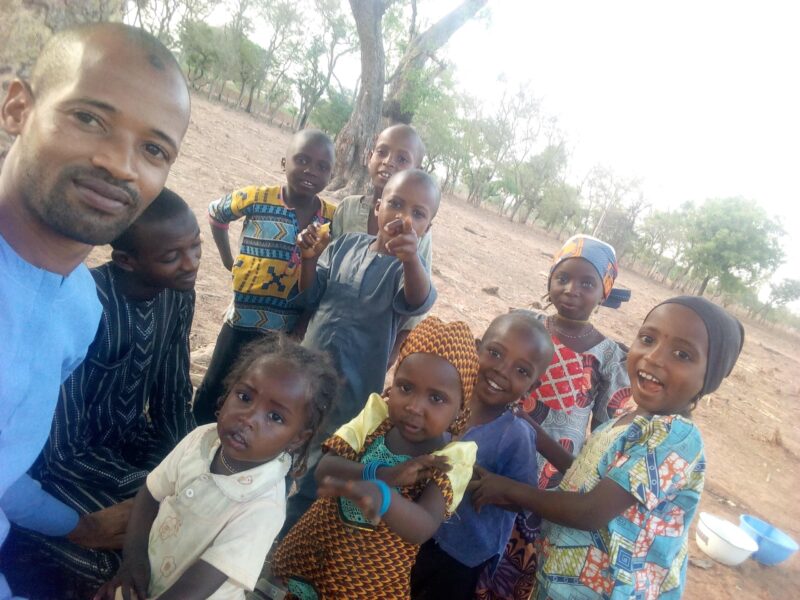
Photo provided by Surajo Teete and used with permission. Surajo is pictured here on the left.
This post is part of a series of interviews with our guest hosts of the @DigiAfricanLang [1] rotating Twitter campaign at Rising Voices.
As part of our ongoing series highlighting the work of activists promoting African languages in digital spaces, we would like to feature Fulfulde translator Surajo Teete (@SurajoTeete [2]) from Nigeria. For Surajo, it is absolutely imperative that the Fulfulde language, also known as Fula or Fulah, is brought into the digital world. Despite Fulfulde being a language spoken by millions of people in different dialects throughout Western Africa, its online presence remains small. In order to reach his goal of increasing the digital presence of Fulfulde and ensuring its preservation, Surajo and his team founded an entirely Fulfulde news outlet called Sakiraaɓe Media [3]. Find out more about Surajo’s motivations to digitize languages, and how, in doing so, we can collectively transcend the geographic and political boundaries that so often act as constraints to human connection.
Rising Voices (RV): Please tell us about yourself and your language-related work.
Surajo Teete (ST): As a language student who got the National Certificate in Education from FCE, Kano and specialized in Fulfulde, English alongside Education, I was exposed to the language endangerment that languages are experiencing, Fulfulde included, due to the nature of its diverse speakers over African countries.
In this pursuit I acquired a Bachelor of Linguistics, from Bayero University, Kano, to equip myself with policies, strategies, and possible ways to sustain the language. During my project I wrote on “Code – Switching as a Step to Language Endangerment: A Case Study of Some Selected Fulɓe Families in Kano Metropolis,” to measure the level of language switching of Fulfulde speakers in Kano.
In our efforts to sustain, and develop Fulfulde, we initiated Sakiraaɓe Media, an outlet that posts news in Fulfulde, both in audio and in written forms. This has gone and done a lot for sustaining and developing the language vocabulary, and maintaining the language usage.
RV: What is the current state of your language both online and offline?
ST: In terms of the number of countries speaking it, Fulfulde is arguably the biggest spoken language in Africa. It is a language that is spoken in a continuum of over 24 African countries. Online, too, it is one of the few, if not only, African languages that broke tens of borders to make up its pool of speakers. It is also one African language that is breaking every colonial construct by bringing people from different parts of Africa, across tens of borders, and bonding them by their common tongue — all thanks to the internet.
There are a number of websites developed and operated in Fulah including the likes of; pulaagu.org, andaltech.com [4], binndipulaar.com [5], boolumbal.org [6], pulaar.org, fulfulde.org [7], oolelpulaar.com [8], tabitalpulaaku.org [9], dingiralfulbe.com [10], naamnee.com [11], fulbemedia.com, koode.net [12] and host of others.
Fulah is broadcast by Rfi, koode Radio International Abuja [13], Voice of Nigeria, Pulaaku FM Yola, Afrika Pulaar Radio and many more.
RV: What are your motivations for seeing your language present in digital spaces?
ST: The motivation is simple: it has to. And I think the reason is visible and staring at us. Digital spaces today are part and parcel of our lives. Loads of our communication is happening right there. Our policies, our politics, our learning, our businesses, our identities, our fears and even our wars are in these digital spaces. What this means is that these spaces are indispensable for the survival of humans and everything they do, their languages inclusive.
Fulfulde, as established earlier, is a widely spoken language offline. If it can leverage the power of these digital spaces it will not only maintain its wide terrain of speakers, but will also — for the first time — get a chance to unify those speakers in their tongue irrespective of any barrier. No border(s). No paperwork and bureaucratic red tape. No citizenship. No nothing. Just language. And language.
RV: Describe some of the challenges that prevent your language from being fully utilized online.
ST: For a language so dispersed like Fulfulde, there are challenges that must be addressed. One among them is maintaining a common orthography. But we know this is difficult, simply because of the dispersion. For example, a Fulfulde speaker from Francophone Africa will have almost an entirely different way of writing Fulfulde from someone who is from Anglophone Africa. (And there is also the influence of local languages). Hence, communication sometimes becomes difficult between Fulfulde speakers of different social backgrounds on these digital spaces simply because of writing the language in borrowed orthographies.
RV: What concrete steps do you think can be taken to encourage young people to begin learning their language or keep using their language?
ST: One, using the same digital spaces to teach Fulɓe the standard Fulfulde orthography born by the UNESCO Bamako Conference of the ‘60s. This, for me, is the best possible way to turn the tide. Fulfulde speakers, for example, from Senegal, Guinea, Ghana and Nigeria can be taught in, say, a webinar about the orthography and be encouraged to use it, something that was not possible in the pre-internet days.
Two, more written material must be written as it is the basis for solidifying all these. Without written material, people will always have to improvise — and we cannot detach that from the influence of their immediate society. Many people are writing English, for example, perfectly, not because they were taught its orthography in class. Rather, they write it so clearly because there is a trove of its written material, everywhere. This is something we must do for the survival of our languages, both online and offline. A language that is not written is romancing the inevitability of death.